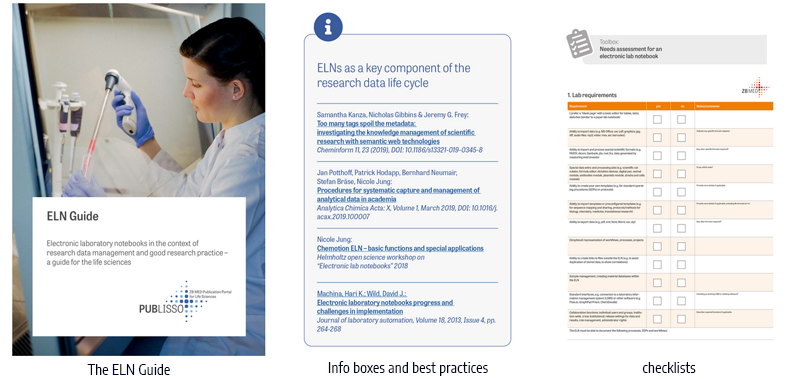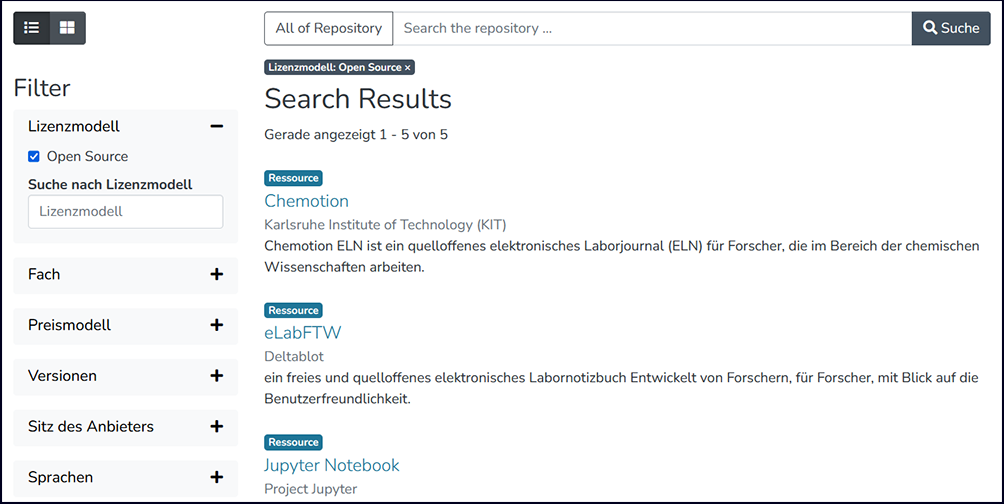Electronic Laboratory Notebooks
Electronic Laboratory Notebooks (ELN) are software applications that allow for research data to be recorded and managed electronically. Ideally, they support the entire research process from planning and implementation to the evaluation of the experiments. In rare cases, the software might even manage or simplify the publication and archiving of the research data. Electronic laboratory notebooks are intended to replace classic laboratory notebooks and help to make data easier to find, access and to facilitate sharing the results with others. Since today, a large part of the data in research is collected in digital form, the use of ELNs avoids unnecessary media breaks.
On this page you will find general information on the subject of electronic laboratory notebooks, as well as product lists and examples of applications already being used at Thuringian research institutions.
An ELN for Researchers in Thuringia
Together with the IT Center of the Thuringian Universities and the zedif: Competence Center for Digital Research, a central electronic lab notebook for researchers in Thuringia is provided based on the software eLabFTW. This instance can be found here, and login is done via Shibboleth using the credentials of the respective university or university of applied sciences in Thuringia. To use the software, a team must be created, which can be requested using this form. Information about updates to this instance is also sent occasionally to interested parties via the elabFTW Thuringia mailing list.
Furthermore, the NFDI4Chem operates an instance of Chemotion, a discipline-specific ELN for chemical research, at the Friedrich Schiller University in Jena. Upon request, this instance can also be used by working groups from other Thuringian universities/universities of applied sciences that conduct chemical research. If you are interested, please contact info@forschungsdaten-thueringen.de.
ELNs at Thuringian Research Institutions
Various electronic laboratory notebooks are already being used in Thuringia. They were chosen and established based on the needs of local laboratories or through larger institutional networks. Below, you will find an overview of these applications, the facilities in which they are used and, if applicable, a contact person you can get in touch with if you have any questions.
| Application | Description |
|
|
As an ELN, Chemotion is designed in particular for the needs of chemical research. It is further developed within the NFDI4Chem and will integrate various features of chemical subdisciplines. The FSU Jena hosts its own Chemotion ELN instance. For more information, please contact the local NFDI4Chem team. |
|
|
The ELN Labfolder is used at the Institute of Microbiology at the Friedrich Schiller University of Jena. The ELN is used by staff in their daily laboratory work and also by students writing their theses. In addition, Labfolder, in combination with online materials on digital research data management, is also integrated into the microbiology practicals at the Bachelor and Master levels. Dr. Torsten Schubert (torsten.schubert@uni-jena.de) is available as a contact person. |
|
|
RSpace is established at the Leibniz Institute on Aging – Fritz Lipmann Institute (FLI) in Jena. The best practice example is also described in the second version of the ELN-Guide of the ZB Med. If you are interested and have any questions about RSpace, please feel free to contact Dr. Karol Szafranski at the FLI (karol.szafranski@leibniz-fli.de). |
 |
eLabFTW was tested at TU Ilmenau at the Centre of Micro- and Nanotechnologies already in fall/winter of 2021 in a pilot project. Some of the participating research groups have decided to integrate the open source tool into their research process. If you have questions about the pilot project, please contact Maria Illing (maria.illing@tu-ilmenau.de), Speaker of the Centre. |
ELN Guide and further information

The infrastructure and research center for life science information and data "ZB MED" (German Central Library for Medicine) makes various articles and aids on the subject of electronic laboratory notebooks available via its open access publication portal PUBLISSO. This also includes the ELN guide. This document not only shows the advantages of using electronic laboratory notebooks, but also gives best-practice examples from various research institutions, guidelines for your own analysis of integrating software as well as checklists that can be used for needs analyses.
Further general information on the subject can be found on the forschungsdaten.info platform. The working group for electronic laboratory notebooks of the state of NRW initiative meets at regular intervals and presents applications that are already being used at various research institutions. Experiences are shared and discussions held on various topics. Access to these meetings is generally open and interested parties without presentations can also participate.
ELN Finder and product listings
Over the last few years, various lists with field reports on electronic laboratory notebooks have been created. In 2019, LabExplorer published a list of applications that were evaluated using a Scorecard, while the Fraunhofer Institute for Manufacturing Engineering and Automation published a recommendation list of field reports on various applications as well. Electronic laboratory notebooks are also explained and listed on the wiki platform forschungsdaten.org. The ZB MED ELN guide is accompanied by an evaluation table of software solutions, in which the applications are categorized according to specific features. This very precise analysis of electronic laboratory notebooks led to the "ELN-Finder" project in cooperation with the University and State Library Darmstadt and the HeFDI network (Hessian Research Data Infrastructure). This portal has been available since 2022. There, electronic lab notebooks or similar applications can be filtered and selected based on a number of useful criteria.




